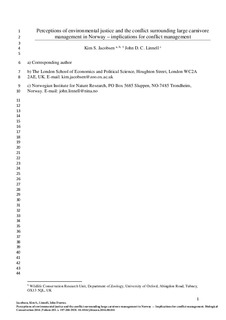| dc.contributor.author | Jacobsen, Kim S. | |
| dc.contributor.author | Linnell, John Durrus | |
| dc.date.accessioned | 2018-01-04T12:24:32Z | |
| dc.date.available | 2018-01-04T12:24:32Z | |
| dc.date.created | 2016-10-07T09:17:48Z | |
| dc.date.issued | 2016 | |
| dc.identifier.citation | Biological Conservation. 2016, 203 197-206. | nb_NO |
| dc.identifier.issn | 0006-3207 | |
| dc.identifier.uri | http://hdl.handle.net/11250/2475670 | |
| dc.description.abstract | Human-wildlife conflict is increasingly being recognised as containing strong elements of social conflict. The extent to which stakeholders regard a management system as being just and fair is a key social dimension of conflict. This paper investigates the perceptions of justice regarding the carnivore conflict in Norway among sheep farmers, environmentalists and indigenous reindeer herders usingQ methodology. Three significant perspectives on environmental justice were identified, which we labelled the Carnivore Advocates (containing most environmentalists), the Carnivore Sceptics (containing most of the sheep farmers and reindeer herders) and the Bureaucratic Carnivore Sceptics (containing the remaining sheep farmers and a reindeer herder). The widest disagreement was over what constitutes environmental harm and environmental goods and how the costs and benefits should be distributed, indicating that fundamental differences in values and perceptions underlie the intractability of this conflict. However, the results of this study suggest that thewidespread conceptualisation of justice as strictly a matter of equitable distribution of costs and benefits is incomplete. Recognition justice, in the form of acknowledging group identity, lifestyle, knowledge and viewpoints, and seeking mutual respect for differences constituted a good in itself for all stakeholders. It cannot therefore just be viewed as a means to establish equitable distribution of goods and harms. Issues related to participatory justice were also identified, but were not attributed great importance. These results confirm the common assumption that the carnivore conflict in Norway is highly polarised. Because the two poles differ fundamentally in their value perceptions regarding carnivores and how that relates to their sense of identity, we characterise the human-wildlife conflict in Norway as a “wicked problem” where decisions regarding the management of carnivores is going to entail political prioritisation of one viewpoint over the other. Environmental justice Carnivore conservation Human-wildlife conflict Carnivore management and policy | nb_NO |
| dc.language.iso | eng | nb_NO |
| dc.rights | Attribution-NonCommercial-NoDerivatives 4.0 Internasjonal | * |
| dc.rights.uri | http://creativecommons.org/licenses/by-nc-nd/4.0/deed.no | * |
| dc.title | Perceptions of environmental justice and the conflict surrounding large carnivore management in Norway — Implications for conflict management | nb_NO |
| dc.type | Journal article | nb_NO |
| dc.type | Peer reviewed | nb_NO |
| dc.description.version | acceptedVersion | nb_NO |
| dc.subject.nsi | VDP::Samfunnsgeografi: 290 | nb_NO |
| dc.subject.nsi | VDP::Human geography: 290 | nb_NO |
| dc.source.pagenumber | 197-206 | nb_NO |
| dc.source.volume | 203 | nb_NO |
| dc.source.journal | Biological Conservation | nb_NO |
| dc.identifier.doi | 10.1016/j.biocon.2016.08.041 | |
| dc.identifier.cristin | 1390110 | |
| dc.relation.project | Norges forskningsråd: 251112 | nb_NO |
| dc.relation.project | Norges forskningsråd: 212919 | nb_NO |
| dc.relation.project | Andre: Norwegian Environment Agency | nb_NO |
| cristin.unitcode | 7511,2,0,0 | |
| cristin.unitname | Avdeling for terrestrisk økologi | |
| cristin.ispublished | true | |
| cristin.fulltext | postprint | |
| cristin.qualitycode | 1 | |

